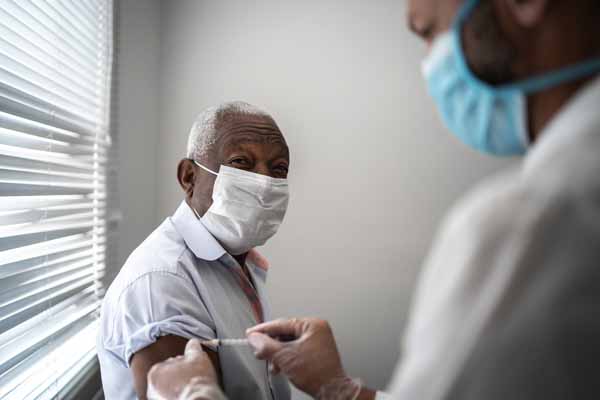
Recent drops in COVID-19 vaccination rates have several causes, but taken together they signal that the effort to immunize Texans has entered a tough new phase – one that will rely more heavily than ever on physicians to distribute the vaccines, says David Lakey, MD, who is vice chancellor for health affairs and chief medical officer at The University of Texas System.
Dr. Lakey also serves on the COVID-19 Expert Vaccine Allocation Panel, which develops and recommends vaccine allocation strategies for the Texas Department of State Health Services (DSHS).
Most of the Texans vaccinated so far have been anxious to get their shots and willing to do so through the big-city hubs that provided vaccines, Dr. Lakey says.
“We’ve done a good job of getting most vulnerable individuals immunized,” he said. “We have about 75% of those 65 and older immunized with at least one dose in Texas. For those between the ages of 50 and 65, it’s about 58%.”
However, misinformation and rumors about the vaccines are common and have prompted a social media response from the Texas Medical Association’s Vaccines Defend What Matters program.
Also, the 10-day “pause” of the Johnson & Johnson (J&J) vaccine by federal agencies due to safety concerns that began April 13 clearly caused some people to reconsider vaccination, Dr. Lakey says.
“I think that scared some individuals, and it probably scared them away not just from the J&J vaccine but other COVID vaccines,” he said.
But even before this interruption, several populations had expressed reluctance to obtain COVID-19 vaccines, Dr. Lakey says. They include older white conservatives who are skeptical of the vaccine’s safety as well as younger people who don’t feel threatened by the illness.
In the coming weeks, physicians will need to employ different strategies and use different venues to attract these and other reluctant Texans, he says. For instance, the vaccine hubs already are giving way to a more diffuse distribution model that relies on physician practices and local pharmacies.
“The next group of individuals is going to be harder,” he said. “There are different pockets of individuals, and I think most of them aren’t antivaccine. I think a lot of them are just hesitant or it just hasn’t been convenient for them.”
Many people who are reluctant to vaccinate want to discuss the decision with a personal physician they trust, Dr. Lakey says. A focus group of conservative Republican voters who have hesitated to get the vaccine said that a physician would influence their decision.
“They want to get information from their own physician, someone they have a relationship with, versus a talking head or a politician,” Dr. Lakey said. “And many of those individuals when they get that recommendation from their physician would be willing to get that vaccine.”
Until recently, physician practices have had difficulty obtaining COVID-19 vaccines, but that is changing. DSHS is encouraging physicians through social media to request COVID-19 vaccine doses.
But even as supply problems ease, physicians offering COVID-19 vaccines will have to work through logistical issues they would not face with other vaccines, says Jason Terk, MD, a Keller pediatrician who chairs the Texas Public Health Coalition and sits on the TMA COVID-19 Outpatient Work Group.
For instance, physicians not only have to be enrolled in ImmTrac2, the state’s vaccination registry, but also they must report information for each patient vaccinated within 24 hours. Physician practices also need to submit a daily report of the doses administered into the Texas Department of Emergency Management Therapeutics and Vaccine Reporting Portal, and they must report any unused or wasted doses into the Texas Vaccine Allocation & Ordering System.
“The reporting requirements are significantly higher, and your staffing needed to accomplish this is not insignificant,” Dr. Terk said. “People need to understand that it’s not a small feat to [administer COVID-19 vaccines] on a smaller scale.”
TMA’s Vaccines Defend What Matters program offers a variety of resources on COVID-19 vaccines and vaccine hesitancy. And as always, check the TMA COVID-19 Resource Center regularly for up-to-date news and the latest TMA materials for your practice.